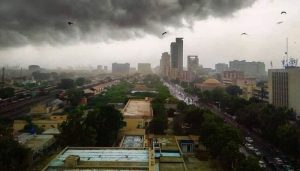
[ad_1]
ISLAMABAD: The Meteorological Department on Thursday announced that three days of heavy rains starting from July 5 are likely to flood local drains and rivers in Islamabad, Rawalpindi and other parts of the country.
As per the details, heavy rains may cause urban flooding in Rawalpindi and other cities of Punjab, as well as landslides in hilly areas of Murree, Galiyat and Gilgit-Baltistan.
Parts of the twin cities were lashed by heavy rains early Thursday morning and the night before, resulting in water logging in the low-lying areas of the Garrison city. Despite causing some flooding, the rain provided much-needed relief from the humid weather.
The Meteorological Department recorded the following rainfall amounts: 44 millimetres in Chaklala, 39mm in Shamsabad, 16mm in Kutchery, 19mm in Saidpur, 21mm in Bokra, 24mm in Golra, 14mm at Islamabad International Airport, and 18mm at Zero Point in Islamabad.
The Met Office has advised relevant authorities in Rawalpindi and Islamabad to prepare for the anticipated rain, with a similar directive issued by Punjab Chief Minister Maryam Nawaz.
Rain in twin cities, floods in low-lying areas
Residents of Rawalpindi’s low-lying areas complained of flooding on Thursday, criticizing sanitation agencies for failing to clean drains ahead of the monsoon rains. In Kent and Chaklala Scheme I, residents reported blockages in drains and sewers.
Mehmood Malik, a resident of Bani Chowk, highlighted the deteriorating situation on Jamia Masjid Road, where the first spell of rain inundated the area, a recurring problem.
The water level in Leh Nullah remained normal. WASA spokesperson Umar Farooq said that due to the rain, the Leh Nullah rose 7.5 feet at Gwalmandi Bridge and 6.5 feet at Kattarian Bridge, but after the rain stopped, water did not accumulate in the low-lying areas. He assured that Wasa is prepared for any possible flood, with heavy machinery ready to drain water in case of emergency. Cleaning of the Leh Nullah is underway and expected to be completed next week, major blockages have already been cleared to prevent the water level from rising.
Regarding Rawal Lake, which supplies water to Rawalpindi, Farooq said that the water level in the dam did not rise as the rain did not affect its catchment areas. However, due to the ongoing rains, the water level is expected to rise in the coming days.
[ad_2]
Source link






